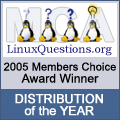NetworkManager is a tool that was designed to make managing wireless networks easy, particularly for laptop users. Unfortunately the tool has always needed some work to get it working right in Ubuntu, seemingly always releasing at the most inopportune time in relation to the Ubuntu schedule, or depending on some development driver in a far away land …
This time, however, things are looking up. Johan Kiviniemi, Mario Danic, Adam Conrad, Luka Renko, and Anthony Mercatante have volunteered to get Network Manager 0.6.1 packages up to shape, with the intent to make it in time for the final release of Dapper. They've put in a ton of work patching code, testing cards, and packaging it all up for testing. Unfortunately, time not particularly abundant these days, but Matthew Garrett was quick to point out:
This is entirely a community contribution, but now that the hard work has been done it should (with luck) be possible to squeeze this in. If people could test the packages and find any bugs as quickly as possible, that makes things a great deal more likely.
The team has put up pages for for NetworkManager (the GNOME front end) and KNetworkManager (the KDE front end) with instructions on how to get started. Bugs can be reported to debian (AT) johan.kiviniemi.name. You can also find _ion and Pygi on Freenode (irc.freenode.net) to report bugs. You'll also find more information in the dicussion thread below.
[Discuss]
